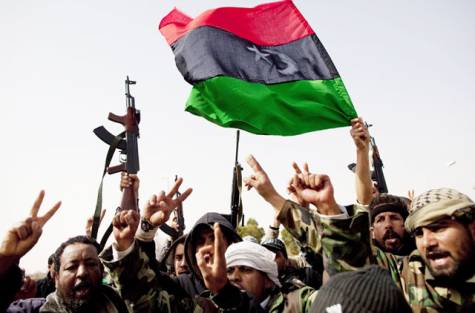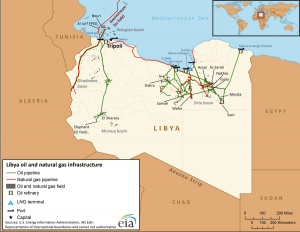
Libya, ISIS, and Oil: How Does the U.S. Proceed?
Estimates from October 2015 suggest that the Islamic State receives up to $50 million a month selling crude oil on the black market. Although that number has decreased slightly since oil’s drop in price and the beginning of a sustained bomber campaign vs. oil refineries, ISIS continues to search for new opportunities to fuel their organization. Their latest movements indicate a shift towards Libya’s “oil crescent,” which is evidence of their continued reliance on oil revenues. This is a clear indication of the need for an updated strategy to combat the Islamic State in Libya. Without it, the Islamic State could gain access to billions of dollars of oil revenue.
Airstrikes have crippled the Islamic State’s ability to transport and refine oil in Syria, and have been the predominant U.S. approach against their oil supply lines. Efforts to cut ISIS oil revenues continue, and so far our extensive air campaign has harmed their oil infrastructure in Iraq and Syria. But ISIS in Libya requires a slightly different strategy, one that emphasizes preventive tactics to cut off their means of economic growth.
The U.S. needs a multifaceted approach to combat ISIS expansion into oil refineries and ports in Libya. Airstrikes alone will not entirely cut off ISIS’s revenue streams obtained from selling oil, and will not stop their fighters from capturing Libyan refineries. I propose an additional approach to combating ISIS’s expansion moving forward: once legitimate parties in Libya are identified, the U.S. should provide tactical support to these parties to help defend oil refineries and ports that may be targeted by ISIS fighters.
ISIS has expanded their occupation of Libya in the past six months. They have gained control of the northern town of Sirte and the coastlines surrounding it. To the southeast of Sirte is Libya’s oil crescent, an expanse of land rich with oil that ISIS will undoubtedly target once they have the proper capability. And although ISIS has not yet profited on Libya’s oil reserves, the possibility still threatens to undermine the country’s economic stability. The group may be biding its time, much as it did in Syria. While recent reports may indicate they may be considered more of a potential threat rather than an imminent threat, the U.S. should still take decisive action to prevent ISIS from expanding in Libya.
The tactical support strategy relies heavily on the United States’ ability to find partners in Libya that are strictly willing to fight ISIS. Therefore, the first step to combating ISIS expansion is to find and establish unity among scattered Libyan groups. The message delivered to Libyan militias should identify ISIS as their largest threat to Libya’s future, not each other. Pentagon spokesman Peter Cook recently mentioned that “there have been some U.S. forces in Libya trying to establish contact with forces on the ground,” and these efforts must continue with haste. Additional resources should be allocated towards these efforts.
Once a group is unified under the common goal of defeating ISIS, then the U.S. and its allies could offer aid and tactical support to Libyan ground forces to halt ISIS’s advance into the oil crescent by offering strategic communication on ISIS’s movements, training forces to combat ISIS advances, and providing monetary assistance to strengthen the capabilities of Libyan forces. The U.S. should support the preemptive defense of oil refineries and ports targeted by the Islamic State to raise ISIS’s cost of capturing Libya’s oil infrastructure. If ISIS can be suffocated before it can expand, its presence in Libya will falter.
If ISIS cannot maintain or increase their revenues, their foreign fighters will receive salary cuts, which encourage defections and undermines the Islamic State’s recruitment narrative. Protecting potential revenue streams from ISIS in Libya will have a similar effect to drops in oil price, cutting their means of expansion.
Of course, providing tactical support to Libyans battling ISIS is not that simple, and neither is finding a Libyan force to support. U.S. “allies” in Libya have largely proved unreliable in the war torn country. Warring militias are divided and poorly organized. The uphill battle against ISIS in Libya has already begun. Success will not happen overnight, but there is still time for the U.S. and its allies to identify and build a cohesive force to combat ISIS and protect Libya’s oil infrastructure, its economy, and its long term well-being. Decisive action should be taken with heightened urgency.






